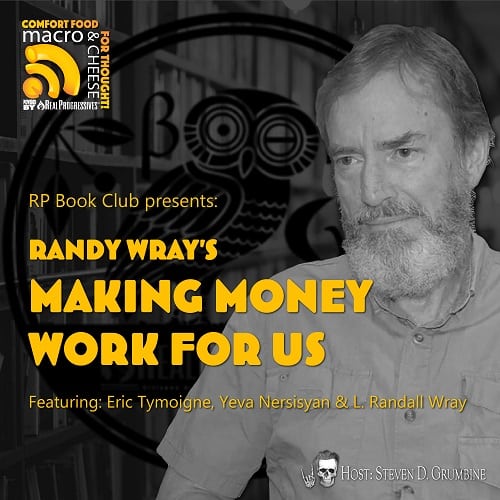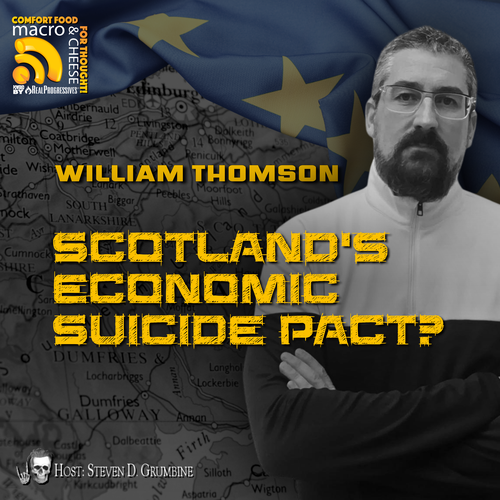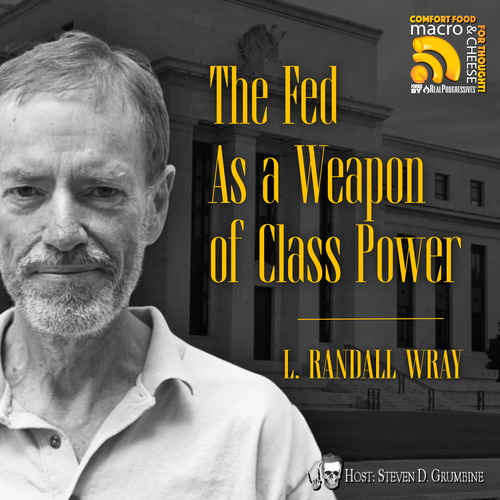Episode 234 – RP Book Club presents: Randy Wray’s Making Money Work for Us

FOLLOW THE SHOW
3 sessions of RP Book Club on L. Randall Wray’s “Making Money Work for Us” a book on MMT for laypeople. Q&A with guest economists Eric Tymoigne, Yeva Nersisyan, and Randy Wray for Us.
**Don’t forget to check out our transcripts! There’s one for every episode of this podcast, as well as a section of “extras” with links to relevant resources. Go to realprogressives.org/macro-n-cheese-podcast/
This week we’re bringing you all three sessions of the Real Progressives Book Club on L. Randall Wray’s Making Money Work for Us.
RP Book Club is run by our volunteers with guest experts leading the discussion and taking questions from attendees.
This is much longer than our usual episodes of Macro N Cheese, so we’ve included the time codes for each session.
[1:43] — Session One
Guest economist Eric Tymoigne
- Chapter 1, What is Money?
- Chapter 2, Where Does Money Come From?
[1:14:35] — Session Two
Guest economist Yeva Nersisyan
- Chapter 3, Can We Have Too Much Money?
- Chapter 4, Balances Balance
- Chapter 5, Life is Full of Trade-Offs
[2:43:33] — Session Three
Guest economist Randy Wray
- Chapter 6, The MMT Alternative Framework for Policy
- Chapter 7, MMT and Policy
Use this link to order the book: Making Money Work for Us: How MMT Can Save America by L. Randall Wray
Eric Tymoigne is an Associate Professor of Economics at Lewis & Clark College in Portland, Oregon; and Research Associate at the Levy Economics Institute of Bard College. @tymoignee on Twitter.
Yeva Nersisyan is an Associate Professor of economics at Franklin and Marshall College and a Research Scholar at the Levy Economics Institute.
L. Randall Wray is a Professor of Economics at Bard College and Senior Scholar at the Levy Economics Institute.
Coming Soon (this transcript is crazy long, but our team is working on it!)
PRESENTER BIOS
Eric Tymoigne
is an Associate Professor of Economics at Lewis & Clark College in Portland, Oregon; and Research Associate at the Levy Economics Institute of Bard College. @tymoignee on Twitter.
Previous MNC appearances:
Episode 31 – MMT Basics with Eric Tymoigne
Episode 113 – Financial Fragility with Eric Tymoigne
Yeva Nersisyan
is an Associate Professor of economics at Franklin and Marshall College and a Research Scholar at the Levy Economics Institute.
Previous MNC appearances:
Episode 161 – Challenging Critiques of MMT with Yeva Nersisyan
Episode 230 – Setting the Bar Low with Yeva Nersisyan
L. Randall Wray
is a Professor of Economics at Bard College and Senior Scholar at the Levy Economics Institute.
Previous MNC appearances:
Randy has been such a frequent guest that he has his own MNC playlist!
PEOPLE MENTIONED
Stephanie Kelton
is an economist and has worked in both academia and politics. She is a leading authority on Modern Monetary Theory, and is considered one of the most important voices influencing the policy debate today.
Michael Hudson
is president of The Institute for the Study of Long-Term Economic Trends (ISLET), a Wall Street financial analyst and a distinguished research professor of economics at the University of Missouri, Kansas City.
Friedrich Hayek
was a 20th century economist and best known advocate of what is now called Austrian economics.
https://www.econlib.org/library/Enc/bios/Hayek.html
Pavlina Tcherneva
is an Associate Professor of Economics at Bard College, the Director of OSUN’s Economic Democracy Initiative, and a Research Scholar at the Levy Economics Institute, NY. She specializes in modern money and public policy.
https://pavlina-tcherneva.net/about/
Rohan Gray
is an Assistant Professor of Law at Willamette University and author whose research focuses on the design and regulation of digital fiat currency. He is the President of the Modern Money Network, the Research Director of the Digital Fiat Currency Institute, and a consultant to the International Telecommunications Union’s Focus Group on Digital Currency.
https://positivemoney.org/rohan-grey/
Bill Mitchell
William Mitchell is Professor of Economics and Director of the Centre of Full Employment and Equity (CofFEE) at the University of Newcastle, NSW Australia and is a leading voice of and early scholar on Modern Monetary Theory.
Janet Yellen
was the former head of the US Federal Reserve Bank and is the current Secretary of the Treasury in the Biden Administration
https://www.federalreservehistory.org/people/janet-l-yellen
https://home.treasury.gov/about/general-information/officials/janet-yellen
Clara Mattei
is an Assistant Professor in the Economics Department of The New School for Social Research, and was a 2018-2019 member of the School of Social Sciences at the Institute for Advanced Studies. Dr. Mattei’s focus is primarily on post-WWI monetary and fiscal policies, and the history of economic thought and methodology.
Bernie Sanders
is an American politician, currently serving a third term as US senator, previously an activist, a lecturer, an eight term US congressman, a Vermont state politician, and a two-time presidential candidate.
https://www.sanders.senate.gov/about-bernie/
John Maynard Keynes
was an early 20th-century British economist, best known as the founder of Keynesian economics and the father of modern macroeconomics. One of the hallmarks of Keynesian economics is that governments should actively try to influence the course of economies.
https://www.investopedia.com/terms/j/john_maynard_keynes.asp
https://www.britannica.com/biography/John-Maynard-Keynes
Isabella Weber
is a German economist working on inflation, China, global trade and the history of economic thought.
She is an Assistant Professor of Economics at the University of Massachusetts Amherst, a Berggruen Fellow, and an Associate in Research at the Fairbank Center, Harvard University.
https://www.isabellaweber.com/about
Paul Volcker
was an economist, corporate executive, political appointee, President of the Federal Reserve Bank of New York, and Chairman of the Federal Reserve’s Board of Governors.
https://www.federalreservehistory.org/people/paul-a-volcker
Larry Summers
Lawrence H. Summers is the Charles W. Eliot University Professor and President Emeritus at Harvard University. He served as the 71st Secretary of the Treasury for President Clinton and the Director of the National Economic Council for President Obama.
https://www.hks.harvard.edu/faculty/lawrence-h-summers
Fadhel Kaboub
is an Associate Professor of economics at Denison University, the President of the Global Institute for Sustainable Prosperity, and the Under Secretary General for Financing for Development with The Organization of Educational Cooperation in Addis Ababa, Ethiopia.
Before settling at Denison in 2008, Dr. Kaboub taught at Simon’s Rock College of Bard and at Drew University where he also directed the Wall Street Semester Program. He has held research affiliations with the Levy Economics Institute, the Economic Research Forum in Egypt, the John F. Kennedy School of Government at Harvard University, and the Center for Full Employment and Price Stability at UMKC.
Dr. Kaboub holds the following degrees: Ph.D. in Economics & Social Science Consortium, 2006, University of Missouri – Kansas City. M.A. in Economics, May 2001, University of Missouri – Kansas City. B.S. in Economics, June 1999, with Distinction. Emphasis: Money & Banking.
https://denison.edu/news-events/featured/148775
https://denison.edu/news-events/featured/148775
Jason Hickel
Dr. Jason Hickel is an economic anthropologist, author, and a Fellow of the Royal Society of Arts. He is Professor at the Institute for Environmental Science and Technology at the Autonomous University of Barcelona, Visiting Senior Fellow at the International Inequalities Institute at the London School of Economics, and Chair Professor of Global Justice and the Environment at the University of Oslo. His research focuses on global political economy, inequality, and ecological economics.
Kyle Moore
is an economist with the Economic Policy Institute’s Program on Race, Ethnicity, and the Economy. He studies economic inequality in the frameworks of stratification economics, political economy, and public health.
https://www.epi.org/people/kyle-k-moore/
Warren Mosler
is an American economist and theorist, and one of the leading voices in the field of Modern Monetary Theory (MMT). Presently, Warren resides on St. Croix, in the US Virgin Islands. An entrepreneur and financial professional, Warren has spent the past 40 years gaining an insider’s knowledge of monetary operations.
Georg Friedrich Knapp
was a German economist who in 1895 published “The State Theory of Money,” which founded the chartalist school of monetary theory, which takes the statist stance that money must have no intrinsic value and strictly be used as governmentally-issued token, i.e., fiat money.
https://en.wikipedia.org/wiki/Georg_Friedrich_Knapp
Hyman Minsky
was an American economist and among the leading proponents of the ideas of John Maynard Keynes.
https://www.levyinstitute.org/about/minsky/
INSTITUTIONS/ORGANIZATIONS
Federal Reserve
The Federal Reserve System is the central bank of the United States. Founded by an act of Congress in 1913, the Federal Reserve’s primary purpose was to enhance the stability of the American banking system.
https://www.federalreservehistory.org/essays/federal-reserve-history
International Monetary Fund (IMF)
is a major financial agency of the United Nations, and an international financial institution claiming it’s mission to be “working to foster global monetary cooperation, secure financial stability, facilitate international trade, promote high employment and sustainable economic growth, and reduce poverty around the world.”
https://en.m.wikipedia.org/wiki/International_Monetary_Fund
Organization for Economic Co-operation and Development (OECD)
is an intergovernmental organization with 38 member countries, founded in 1961 to stimulate economic progress and world trade.
https://en.wikipedia.org/wiki/OECD
EVENTS
New Deal
was a series of domestic programs initiated and developed the administration of President Franklin D. Roosevelt (FDR) between 1933 and 1939, which took action to bring about immediate economic relief as well as reforms in industry, agriculture, finance, waterpower, labour, and housing, vastly increasing the scope of the federal government’s activities.
https://www.britannica.com/event/New-Deal
Green New Deal
In 2006, a Green New Deal was created by the Green New Deal Task Force as a plan for one hundred percent clean, renewable energy by 2030 utilizing a carbon tax, a jobs guarantee, free college, single-payer healthcare, and a focus on using public programs.
https://berniesanders.com/issues/green-new-deal/
Medicare for All
is a proposed policy to create a government-run “single-payer” socialist healthcare system in the United States by expanding the existing Medicare program from covering primarily older individuals to covering all citizens.
https://www.influencewatch.org/movement/medicare-for-all/
2008 Global Financial Crisis
The 2007-09 economic crisis was deep and protracted enough to become known as “the Great Recession” and was followed by what was, by some measures, a long but unusually slow recovery.
https://www.federalreservehistory.org/essays/great-recession-and-its-aftermath
CONCEPTS
Political Economy
is an interdisciplinary branch of the social sciences. It focuses on the interrelationships among individuals, governments, and public policy. Political economists study how economic theories such as capitalism, socialism, and communism work in the real world.
https://www.investopedia.com/terms/p/political-economy.asp
Modern Monetary Theory (MMT)
is a heterodox macroeconomic supposition that asserts that monetarily sovereign countries (such as the U.S., U.K., Japan, and Canada) which spend, tax, and borrow in a fiat currency that they fully control, are not operationally constrained by revenues when it comes to federal government spending.
Put simply, modern monetary theory decrees that such governments do not rely on taxes or borrowing for spending since they can issue as much money as they need and are the monopoly issuers of that currency. Since their budgets aren’t like a regular household’s, their policies should not be shaped by fears of a rising national debt, but rather by price inflation.
https://www.investopedia.com/modern-monetary-theory-mmt-4588060
https://gimms.org.uk/fact-sheets/macroeconomics/
Capital Order
Clara Mattei, in her book The Capital Order, asserts the primacy of capital over labor in the hierarchy of social relations within the capitalist production process. That primacy was threatened after World War I in what she describes as the greatest crisis in the history of capitalism. Among the concepts the author discusses is a so called “Trinity of Austerity” through which the Capital Order asserts dominance over labor by the combination of Monetary (interest rate increase), Fiscal (reductions in spending for social need), and Industrial (layoff, wage/work hours reduction) Austerity with the desired, yet implicit, intention of increasing tension, and therefore pliability, among the working classes.
Socialism
is a political philosophy and movement encompassing a wide range of economic and social systems which are characterized by social ownership of the means of production, as opposed to private ownership. As a term, it describes the economic, political, and social theories and movements associated with the implementation of such systems. Social ownership can be public, community, collective, cooperative, or employee. While no single definition encapsulates the many types of socialism, social ownership is the one common element, and is considered left-wing.
https://en.wikipedia.org/wiki/Socialism
Neoliberalism
is now generally thought to label the philosophical view that a society’s political and economic institutions should be robustly liberal and capitalist, but supplemented by a constitutionally limited democracy and a modest welfare state.
https://plato.stanford.edu/entries/neoliberalism/
Marxism
is a left-wing to far-left method of socioeconomic analysis that uses a materialist interpretation of historical development, better known as historical materialism, to understand class relations and social conflict and a dialectical perspective to view social transformation. It originates from the works of 19th-century German philosophers Karl Marx and Friedrich Engels. As Marxism has developed over time into various branches and schools of thought, no single, definitive Marxist theory exists.
https://en.wikipedia.org/wiki/Marxism
Class Theory
Marxian class theory asserts that an individual’s position within a class hierarchy is determined by their role in the production process, and argues that political and ideological consciousness is determined by class position.[1] A class is those who share common economic interests, are conscious of those interests, and engage in collective action which advances those interests.[2] Within Marxian class theory, the structure of the production process forms the basis of class construction.
https://en.wikipedia.org/wiki/Marxian_class_theory
Capitalism
is often thought of as an economic system in which private actors own and control property in accord with their interests, and demand and supply freely set prices in markets in a way that can’ ostensibly, serve the best interests of society.
https://www.imf.org/external/pubs/ft/fandd/2015/06/basics.htm
https://www.thebalancemoney.com/capitalism-characteristics-examples-pros-cons-3305588
Class Consciousness
In Marxist thought, class consciousness is the set of beliefs that a person holds regarding their social class or economic rank in society, the structure of their class, and their class interests. According to Karl Marx, it is an awareness that is key to sparking a revolution that would “create a dictatorship of the proletariat, transforming it from a wage-earning, property-less mass into the ruling class”
https://en.wikipedia.org/wiki/Class_consciousness
Capital Flight
in economics, occurs when assets or money rapidly flow out of a country, due to an event of economic consequence or as the result of a political event such as regime change or economic globalization. Such events could be an increase in taxes on capital or capital holders or the government of the country defaulting on its debt that disturbs investors and causes them to lower their valuation of the assets in that country, or otherwise to lose confidence in its economic strength.
https://en.wikipedia.org/wiki/Capital_flight
Stagflation
is an economic cycle characterized by slow growth and a high unemployment rate accompanied by inflation. Economic policymakers find this combination particularly difficult to handle, as attempting to correct one of the factors can exacerbate another.
https://www.investopedia.com/terms/s/stagflation.asp
Feudalism
was the system in 10th-13th century European medieval societies where a social hierarchy was established based on local administrative control and the distribution of land into units (fiefs). A landowner (lord) gave a fief, along with a promise of military and legal protection, in return for a payment of some kind from the person who received it (vassal).
https://www.worldhistory.org/Feudalism/
Macroeconomics
is a branch of economics that studies how an overall economy—the markets, businesses, consumers, and governments—behave. Macroeconomics examines economy-wide phenomena such as inflation, price levels, rate of economic growth, national income, gross domestic product (GDP), and changes in unemployment.
https://www.investopedia.com/terms/m/macroeconomics.asp
Microeconomics
is a branch of mainstream economics that studies the behavior of individuals and firms in making decisions regarding the allocation of scarce resources and the interactions among these individuals and firms.
https://en.wikipedia.org/wiki/Microeconomics#Information_economics
Keynesianism
Keynesian economics, the body of ideas set forth by John Maynard Keynes in his General Theory of Employment, Interest and Money, and other works, intended to provide a theoretical basis for government full-employment policies. It was the dominant school of macroeconomics and represented the prevailing approach to economic policy among most Western governments until the 1970s.
https://www.britannica.com/topic/Keynesian-economics
https://www.investopedia.com/terms/k/keynesianeconomics.asp
Post Keynesianism (PKE)
is a school of economic thought which builds upon John Maynard Keynes’s and Michal Kalecki’s argument that effective demand is the key determinant of economic performance. PKE rejects the methodological individualism that underlies much of mainstream economics. Instead, PKE argues that fundamental uncertainty and social conflict require an analysis of human behavior based on social conventions and heuristics embedded in specific institutional contexts.
https://www.postkeynesian.net/post-keynesian-economics/
Landings (Soft and Hard)
“Soft landings,” that is, cases in which the central bank tightens monetary policy to fight inflation but does not cause a recession (which would be a “hard landing”), are thought to be difficult to achieve and extremely rare.
https://www.aeaweb.org/articles?id=10.1257/jep.37.1.101
Inflation/Hyperinflation
is a term to describe rapid, excessive, and out-of-control general price increases in an economy.
https://www.investopedia.com/terms/h/hyperinflation.asp
Labor Force Participation Rate
is defined by the Current Population Survey (CPS) as “the number of people in the labor force as a percentage of the civilian non institutional population […] the participation rate is the percentage of the population that is either working or actively looking for work.”
https://fred.stlouisfed.org/series/CIVPART
Federal Job Guarantee
The job guarantee is a federal government program to provide a good job to every person who wants one. The government becoming, in effect, the Employer of Last Resort.
The job guarantee is a long-pursued goal of the American progressive tradition. In the 1940s, labor unions in the Congress of Industrial Organizations (CIO) demanded a job guarantee. Franklin D. Roosevelt supported the right to a job in his never-realized “Second Bill of Rights.” Later, the 1963 March on Washington demanded a jobs guarantee alongside civil rights, understanding that economic justice was a core component of the fight for racial justice.
https://www.sunrisemovement.org/theory-of-change/what-is-a-federal-jobs-guarantee/
https://www.currentaffairs.org/2021/05/pavlina-tcherneva-on-mmt-and-the-jobs-guarantee
Federal Job Guarantee Frequently Asked Questions
https://pavlina-tcherneva.net/job-guarantee-faq/
Climate Change Solutions Through the MMT Lens
Governments with currency issuing powers already have a unique capacity to command and shape the profile of how national resources are used and allocated. This would be achievable through a combination of fiscal deficit investment in green technology alongside a more stringent legislative and tax framework to drive the vital behavioral change essential to addressing the life-threatening effects of climate change. In this way, and by moving the emphasis away from excessive consumption and its detrimental effects on the environment, governments could focus on the delivery of public and social purpose with more appropriate, fairer and efficient use of land, food and human capital in a sustainable way. The implementation of a Job Guarantee Program could also play a pivotal role in reshaping our economy and making the necessary shift towards a greener and more sustainable future.
https://gimms.org.uk/2018/10/13/the-economics-of-climate-change/
Cost Push/Demand Pull Inflation
Inflation refers to the rate at which the overall prices of goods and services rises resulting in the decrease in the purchasing power of the common man, which can be measured through Consumer Price Index. Modern analysis of inflation revealed that it is mainly caused either by demand side or supply side or both the factors. Demand side factors result in demand-pull inflation while supply side factors lead to cost-push inflation.
https://keydifferences.com/difference-between-demand-pull-and-cost-push-inflation.html
Relative Value
is the attractiveness measured in terms of risk, liquidity, and return of one financial instrument relative to another, or for a given instrument, of one maturity relative to another.
https://en.wikipedia.org/wiki/Relative_value_(economics)
Consumer Price Index (CPI)
measures the monthly change in prices paid by U.S. consumers. The Bureau of Labor Statistics (BLS) calculates the CPI as a weighted average of prices for a basket of goods and services representative of aggregate U.S. consumer spending and can, with that information, calculate inflation/deflation within the economy.
https://www.investopedia.com/terms/c/consumerpriceindex.asp
Profit Margin
is a percentage measurement of profit that expresses the amount a company earns per dollar of sales. If a company makes more money per sale, it has a higher profit margin. Gross profit margin and net profit margin, on the other hand, are two separate profitability ratios used to assess a company’s financial stability and overall health.
Wage/Price Spiral
In macroeconomics, a wage-price spiral (also called a wage/price spiral or price/wage spiral) is a proposed explanation for inflation, in which wage increases cause price increases which in turn cause wage increases, in a positive feedback loop.
https://en.wikipedia.org/wiki/Wage-price_spiral
Price/Profit Spiral
is when corporations raise prices by more than the increase in their costs in a way that perpetuates inflation.
https://tuac.org/news/profit-price-spirals-are-driving-inflation-and-increasing-inequality/
Aggregate Demand
is a term used in macroeconomics to describe the total demand for goods produced domestically, including consumer goods, services, and capital goods.
The non-accelerating inflation rate of unemployment (NAIRU)
is the specific level of unemployment that is evident in an economy that does not cause inflation to increase.
https://www.investopedia.com/terms/n/non-accelerating-rate-unemployment.asp
Gross Domestic Product (GDP)
is a monetary measure of the market value of all the final goods and services produced and sold in a specific time period by a country or countries.
https://en.wikipedia.org/wiki/Gross_domestic_product
Entitlement (Economic)
is, generally, any government-provided or government-managed benefit or service to which some or all individuals are entitled by law.
https://www.britannica.com/money/entitlement
Automatic Stabilizers
are mechanisms built into government budgets, without any vote from legislators, that increase spending or decrease taxes when the economy slows.
https://www.brookings.edu/blog/up-front/2019/07/02/what-are-automatic-stabilizers/
The Global South
refers broadly to regions of Latin America, Asia, Africa, and Oceania. It is one of a family of terms, including “Third World” and “Periphery,” that denote regions outside Europe and North America, mostly (though not all) low-income and often politically or culturally marginalized. The use of the phrase Global South marks a shift from a central focus on development or cultural difference toward an emphasis on geopolitical relations of power.
https://journals.sagepub.com/doi/pdf/10.1177/1536504212436479
Currency Issuer/User
As a major component of Modern Money thought, understanding the difference between an issuer of its own sovereign currency: nations such as the United States, the United Kingdom, Japan, Australia, etc, and any entity that must use the sovereign currency of the issuer: a state, a business, a family, an individual, is key to understanding modern fiat currency systems as a whole. It must be acknowledged that a currency issuer is not constrained by taxation or borrowing as a limit to currency issuance and should not be fiscally limited in providing for the common good.
Debt ceiling
The debt limit is the total amount of money that the United States government is authorized to borrow to meet its existing legal obligations, including Social Security and Medicare benefits, military salaries, interest on the national debt, tax refunds, and other payments.
https://www.investopedia.com/terms/d/debt-ceiling.asp
https://stephaniekelton.substack.com/p/the-debt-ceiling-limit-is-destructive
Austerity
refers to a set of economic policies that a government implements in order to control public sector debt, or alternatively, along with industrial austerity, as a means to discipline labor
https://www.investopedia.com/terms/a/austerity.asp
Monetary Sovereignty
Today, the concept of monetary sovereignty is typically used in a Westphalian sense to denote the ability of states to issue and regulate their own currency. This understanding continues to be the default use of the term by central bankers and economists and in fields ranging from modern monetary theory to international political economy and international monetary law. As we argue in this article, the Westphalian conception of monetary sovereignty rests on an outdated understanding of the global monetary system and the position of states in it. This makes it unsuitable for the realities of financial globalization.
Neoliberalism
is now generally thought to label the philosophical view that a society’s political and economic institutions should be robustly liberal and capitalist, but supplemented by a constitutionally limited democracy and a modest welfare state.
https://plato.stanford.edu/entries/neoliberalism/
Fixed Exchange Rate/Floating Exchange Rate
Exchange rate is the value of another country’s currency compared to that of your own. Fixed exchange rates mean that two currencies will always be exchanged at the same price while floating exchange rates mean that the prices between each currency can change depending on market factors; primarily supply and demand.
https://www.investopedia.com/trading/floating-rate-vs-fixed-rate/
Bond Yield
is the return an investor realizes on a bond.
https://www.investopedia.com/terms/b/bond-yield.asp
Zero Interest Rate Policy (ZIRP)
is when a central bank sets its target short-term interest rate at or close to 0% with the goal of stimulating economic activity by encouraging low-cost borrowing and greater access to cheap credit by firms and individuals.
https://www.investopedia.com/articles/investing/031815/what-zero-interestrate-policy-zirp.asp
Monetary/Fiscal Spending
Monetary policy refers to the actions of central banks to achieve macroeconomic policy objectives such as price stability, full employment, and stable economic growth. Fiscal policy refers to the tax and spending policies of the federal government. In the United States, fiscal policy decisions are determined by the Congress and the Administration; the Federal Reserve, as the central bank, plays no role in determining fiscal policy.
Dollar Hegemony
is an economic and political concept in which a single nation state has decisive influence over the functions of the international monetary system.
https://en.wikipedia.org/wiki/Monetary_hegemony
Dedollarisation
refers to countries reducing reliance on the U.S. dollar as a reserve currency, medium of exchange or as a unit of account.
https://en.wikipedia.org/wiki/Dedollarisation
Taxation within a Fiat System
The monetary system that the United States employs is a state money, or fiat, system, and from that framing, the most important purpose of taxes is to create a demand for the state’s money (specifically, for its currency). Further, being the monopoly issuer of its own currency, the state really does not need tax revenue to spend and can never run out of money to pay debts or provision itself so long as it’s spending is denominated in its own currency.
https://realprogressives.org/a-meme-for-money-part-4-the-alternative-tax-meme/
Related Podcast Episodes
Related Articles

Shoring Up the Green Party







